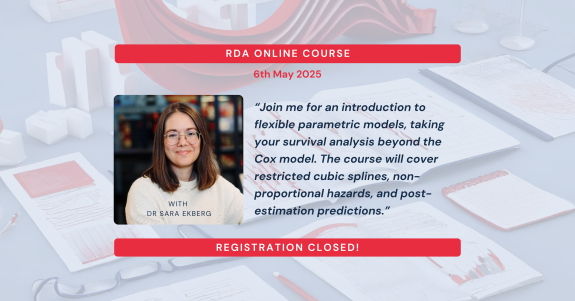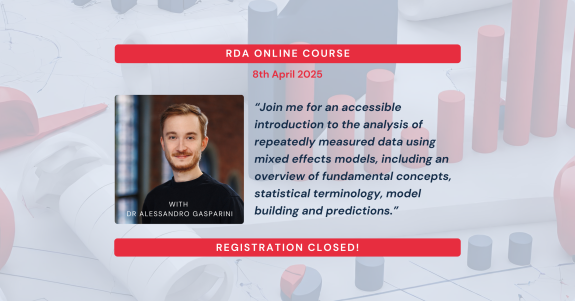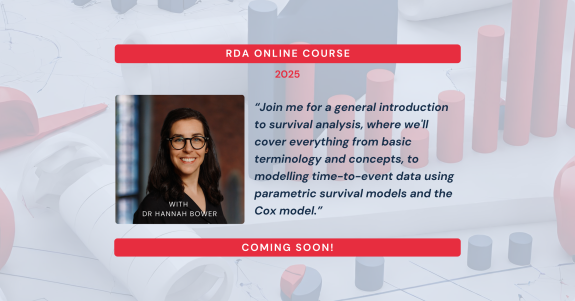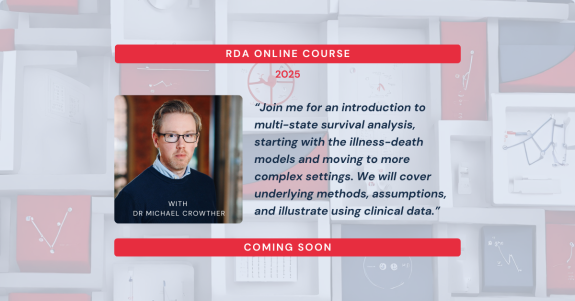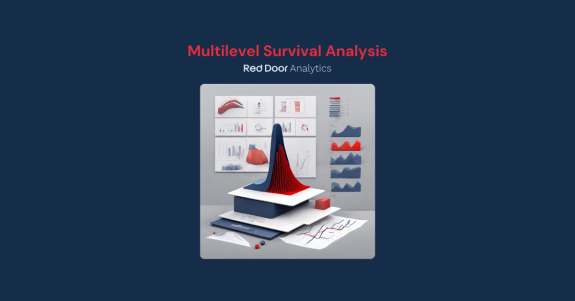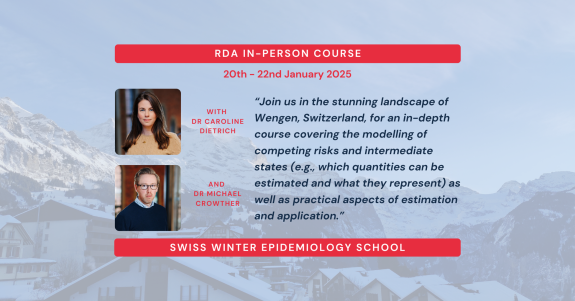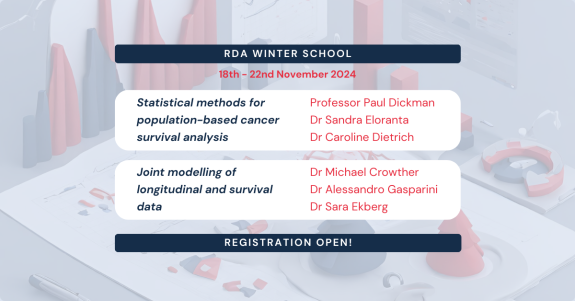
When
The third edition of the RDA Winter School is confirmed to run on from the 17th to the 21st of November 2025!
Where
Forskaren
Hagaesplanaden 49
Stockholm
Sweden
Course 1 : Causal inference in survival analysis
Dates: Monday – Tuesday (17/11 – 18/11)
Schedule: 9am – 5pm
| Course faculty: | ||
 |
||
| Dr Elisavet Syriopoulou |
Course description: This 2-day course provides a comprehensive introduction to the key concepts and methodologies of causal inference using observational data. The course is designed to build a conceptual foundation in this popular field and its principles. Topics include potential outcomes, graphical models (DAGs), identification assumptions, and estimation methods such as regression standardisation. Additionally, the course introduces causal inference in survival analysis and explores important causal estimands. While the focus is providing a comprehensive introduction to causal inference concepts, participants will engage in both lectures and hands-on sessions, with statistical code provided to support practical application.
Day 1: Introduction to causal inference
Day 2: Causal inference in survival analysis
Course 2: Competing risks and multi-state models
Dates: Wednesday – Friday (19/11 – 21/11)
Schedule: 9am – 5pm
| Course faculty: | ||
 |
 |
 |
| Dr Caroline Dietrich | Dr Michael Crowther | Dr Sara Ekberg |
Course description: This course will focus on how to analyse and interpret data in the competing risk, and the more general, multi-state model setting. Competing risks models play an increasingly important role for predicting absolute risks of disease and prognosis using time to event data. An overarching goal of this course is to provide a solid introduction to important concepts in the presence of competing risks (e.g., which quantities can be estimated and what they represent) as well as practical aspects of estimation. Multi-state models provide an extension to the competing risks situation, enabling modelling of complex disease pathways. By modelling transitions between disease states, accounting for competing events at each transition, we can gain an improved understanding of a patient’s prognosis and how risk factors impact over the whole disease pathway. Throughout the course we will place emphasis on the use of flexible parametric survival models that incorporate restricted cubic splines on the log hazard or log cumulative hazard scale. This will include models with time-dependent effects (non-proportional hazards). We will focus on obtaining clinically useful and directly interpretable predictions, which are particularly useful for more complex models, but also describe the challenges and various approaches to calculating them. We will also discuss assumptions of the models, including the Markov assumption and how this can be relaxed. Real-world examples will be presented and discussed.
Day 1: Competing risks
Day 2: Multi-state models I
Day 3: Multi-state models II
General course information
Course fees
| Course I (2-days) |
Course II (3-days) |
Courses I & II (one-week) |
|
| Early bird fees* |
|||
| Academic fee | 6 250 SEK | 8 950 SEK | 14 950 SEK |
| Industry fee | 8 950 SEK | 11 950 SEK | 19 450 SEK |
| Regular fees |
|||
| Academic fee | 6 950 SEK | 9 950 SEK | 15 950 SEK |
| Industry fee | 9 950 SEK | 12 950 SEK | 20 950 SEK |
*Early bird fees apply to registrations completed before midnight CEST on June 27. Please note that all fees are excluding VAT and that our general terms and conditions apply.
What to expect
The course faculty have experience both developing statistical methods and applied clinical research. We expect the participants to have heterogeneous backgrounds (including statisticians, epidemiologists, and clinicians) and to have considerable knowledge and experience to complement that of the faculty. The course will include lectures on key topics, which we hope will be of interest to all participants. Our aim is for the teaching to be participant-centered, and we will devote considerable time to practical sessions where a large faculty will be on hand to provide individual (or small-group) instruction in the areas of specific interest to participants. We ask that participants state their areas of interest on the course application form, and we will do our best to provide tailored instruction with a suitably qualified faculty member. We are happy to discuss your ongoing research projects with you during the course, whether they be development of methods or application of methods. Bring your data with you if you can!
Computing
The primary software for the course will be Stata, with support for Stata version 17 or higher. A temporary Stata license can be provided on request when you register. Participants are welcome to use R instead, with full support and materials available. Please state your chosen software in the course registration so we can prepare. We are happy to discuss concepts and methods with participants who use other software, but we can’t promise software-specific expertise.
Who should attend?
Epidemiologists, statisticians, physicians, public health specialists or anyone with an interest in advanced survival analysis. The methods we teach can be applied to any area. The course faculty have their formal training in mathematics and statistics but devote a large proportion of their time to applied clinical research. The primary target audience is researchers, irrespective of background.
Expected prior knowledge
We expect participants to possess basic knowledge of the fundamentals of epidemiology and biostatistics and be comfortable fitting statistical models in epidemiology (e.g., logistic regression, Poisson regression, or Cox regression). Based on experience, we know that participants will have a wide range of backgrounds. Some of the content will be directed at those with formal training in statistics, but the main emphasis of the course will be on concepts and application with a minimum of complex mathematical detail. Participants will gain most if they have some previous knowledge of basic concepts in survival analysis such as survival functions, Kaplan-Meier curves, and Cox regression.
Please check out our FAQs for more information.
Register your place*
Registration form (opens in a new tab)
*Registration closes at midnight CEST on October 17.



